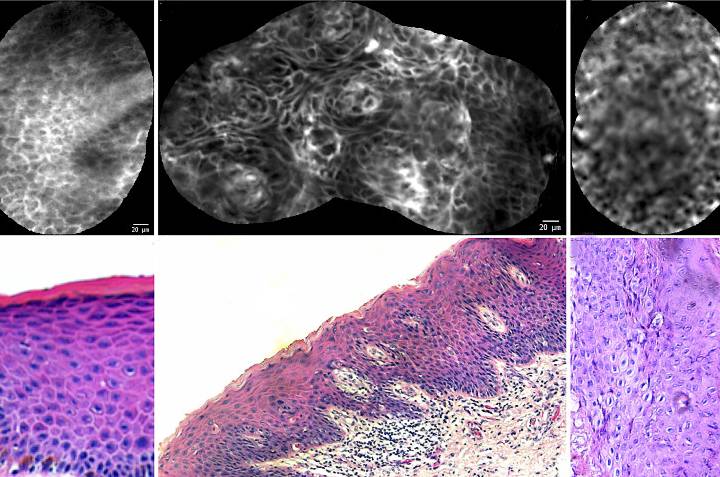 Modern techniques such as confocal microscopy can reduce the need for biopsies and help to reduce tissue loss if surgery is required.
Modern techniques such as confocal microscopy can reduce the need for biopsies and help to reduce tissue loss if surgery is required.
As with all cancers, penile cancer is caused by cells growing out of control, in most cases skin cells. The disease is able to spread to nearby lymph nodes, ultimately other organs.
These later stages can require deeper treatment, such as chemotherapy, or radiotherapy. For our patients and clinic, we want to focus on early stage diagnosis and treatment, the best way to avoid significant intervention.
This can be for pre-cancerous conditions, such as penile intraepithelial neoplasia, or the similar Bowen’s disease (squamous cell carcinoma in situ). Early stages of other skin cancers can be found and warrant treatment.
The foreskin is the most vulnerable area, with the penis head (glans penis) also at risk, although other parts of the penis could be affected.
Penile cancer is fairly rare and can be confused with bacterial or fungal infections. This may lead to the condition being ignored, appreciating the symptoms you have and seeking support as soon as possible is important.
Symptoms & Diagnosis
Early symptoms can include thickening of the skin, along with changes in colour, perhaps white, or red scaly patches, or red moist patches. These can change to become rash like, or turn into bluish brown, or crusty bumps over time.
Sores which refuse to heal can be a further symptom, possibly bleeding, or discharge from the penis. Any sore which does not heal within a reasonable time should be treated with suspicion and professionally examined.
A consultant dermatologist specialising in treating genital skin cancer can often diagnose cases visually. A biopsy could be required to analyse concerning tissue, or a non surgical alternative, such as confocal laser microscopy.
Your medical history will be carefully considered. Long term scarring may predispose to penile carcinoma, or a history of lichen sclerosus et atrophicus, particularly if you are not circumcised, phimosis (a tight foreskin) can be a contributory factor.
Your examination is also an opportunity to assess less evident issues. Penile freckling can indicate a predisposition to skin cancer, such as in PTEN hamartoma tumor syndrome, penile melanoma is rare but spotting early signs is vital.
People who develop squamous cell carcinoma, or malignant melanoma often have precursor conditions. Alongside immediate symptoms, your consultant will assess wider signs, part of ensuring that treatment looks to the future.
Penile Cancer Treatment
Treatment for quite early penile cancer can be non surgical, using topical creams, laser treatment is a further possibility.
In more established cases, surgery is likely to be required but cosmetic and functional aspects are a high priority. Mohs surgery, a day surgery technique designed to reduce tissue damage may be suitable.
Treatment will be tailored to each, unique case, with the focus on minimal intervention for maximum effect. We appreciate that concerns will arise but every care is taken and the best way to avoid deeper treatment is to treat as early as possible.
Care At Our Clinic
The exact cause of penile cancer is unknown and may vary individually. Genetics can play a part, lifestyle choices, infection with the human papilloma virus, other skin conditions which were left untreated.
Whether a precursor to cancer, skin cancer itself, or another condition, the team at our London clinic will offer in depth support for all male genital conditions. They are affecting a part of your body which is critical.
Please don’t feel embarrassed, or hope the problem will go away. The latest diagnostics and treatment techniques offer safe care in a confidential setting.
